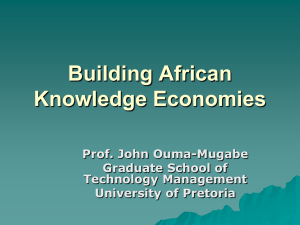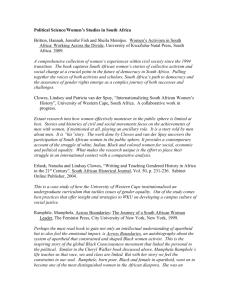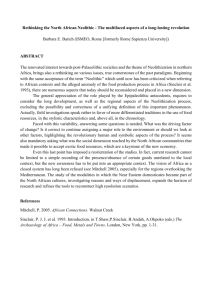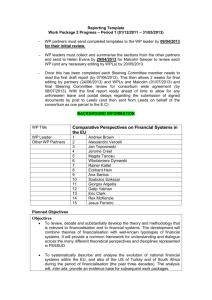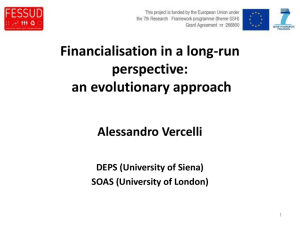Transcript - London School of Economics and Political Science
advertisement
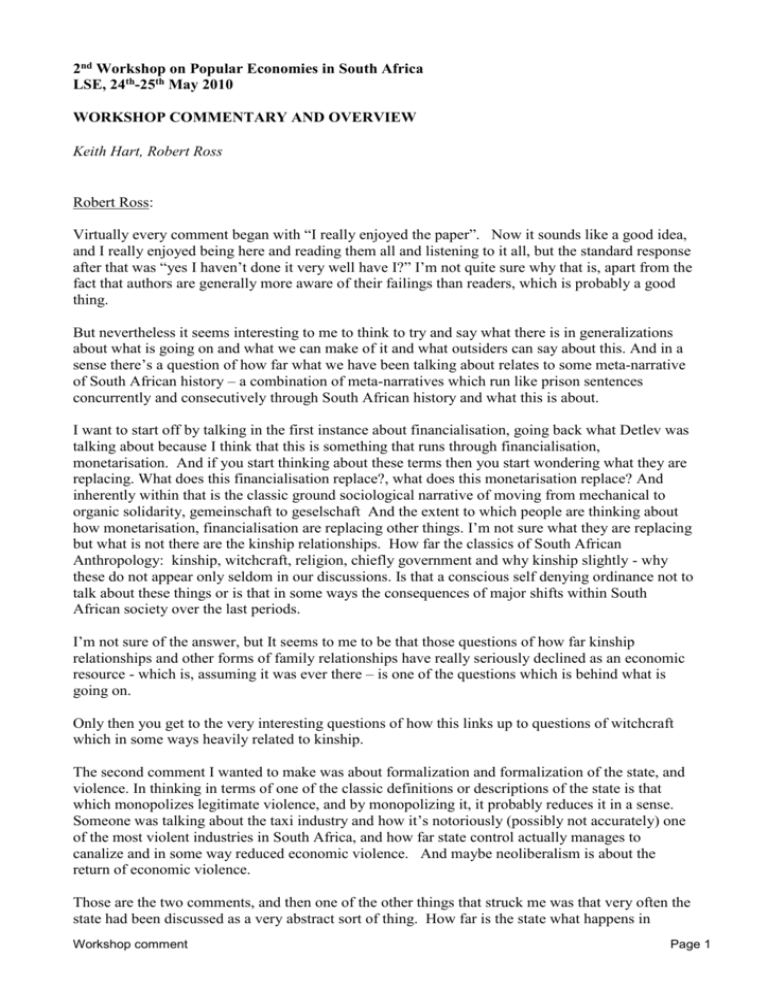
2nd Workshop on Popular Economies in South Africa LSE, 24th-25th May 2010 WORKSHOP COMMENTARY AND OVERVIEW Keith Hart, Robert Ross Robert Ross: Virtually every comment began with “I really enjoyed the paper”. Now it sounds like a good idea, and I really enjoyed being here and reading them all and listening to it all, but the standard response after that was “yes I haven’t done it very well have I?” I’m not quite sure why that is, apart from the fact that authors are generally more aware of their failings than readers, which is probably a good thing. But nevertheless it seems interesting to me to think to try and say what there is in generalizations about what is going on and what we can make of it and what outsiders can say about this. And in a sense there’s a question of how far what we have been talking about relates to some meta-narrative of South African history – a combination of meta-narratives which run like prison sentences concurrently and consecutively through South African history and what this is about. I want to start off by talking in the first instance about financialisation, going back what Detlev was talking about because I think that this is something that runs through financialisation, monetarisation. And if you start thinking about these terms then you start wondering what they are replacing. What does this financialisation replace?, what does this monetarisation replace? And inherently within that is the classic ground sociological narrative of moving from mechanical to organic solidarity, gemeinschaft to geselschaft And the extent to which people are thinking about how monetarisation, financialisation are replacing other things. I’m not sure what they are replacing but what is not there are the kinship relationships. How far the classics of South African Anthropology: kinship, witchcraft, religion, chiefly government and why kinship slightly - why these do not appear only seldom in our discussions. Is that a conscious self denying ordinance not to talk about these things or is that in some ways the consequences of major shifts within South African society over the last periods. I’m not sure of the answer, but It seems to me to be that those questions of how far kinship relationships and other forms of family relationships have really seriously declined as an economic resource - which is, assuming it was ever there – is one of the questions which is behind what is going on. Only then you get to the very interesting questions of how this links up to questions of witchcraft which in some ways heavily related to kinship. The second comment I wanted to make was about formalization and formalization of the state, and violence. In thinking in terms of one of the classic definitions or descriptions of the state is that which monopolizes legitimate violence, and by monopolizing it, it probably reduces it in a sense. Someone was talking about the taxi industry and how it’s notoriously (possibly not accurately) one of the most violent industries in South Africa, and how far state control actually manages to canalize and in some way reduced economic violence. And maybe neoliberalism is about the return of economic violence. Those are the two comments, and then one of the other things that struck me was that very often the state had been discussed as a very abstract sort of thing. How far is the state what happens in Workshop comment Page 1 Pretoria, how far is it the local municipality – and what is the relationship between these two institutions. Do people think of the state as Pretoria or do people think of the state as the municipality or do you talk about the state as various people? When I was wandering around the Ciskei people talked about getting their permits from Bisho - which I suppose is true because it’s the capital of the Eastern Cape. The economic effects of the new organisation of local government and the importance of local government for the development of services is something which is clearly part of what we have been dealing with. And that the state is registrar as well as legislator. Relationships of service provision and local government seems to me to be of major importance. Economics is clearly at its most crude is about ‘getting and spending’. We tended to talk more about getting than about spending - about how people acquire money, not what they do with it. This is strange. One of the things that fascinates me in terms of what people actually spend their money on and how that works, and how South African material culture has shifted so radically over the last century. There is very little in the modern South African household that would have been in a Zulu household 150 years ago. Of course, few of us have anything that is 150 years old, most of us don’t even have things that are ten years old. But also in terms of categorically, things you get in South African households are not the things that would have been in previous households, such as chairs, tables, beds, forks, spoons, clothing. All those sorts of things have categorically shifted. And how that has happened is something that interests me. Something, which I find, I need to look at ethnographies to find some sort of answer. In terms of meta-narratives there is also the question hanging over us of how important the end of apartheid was. There are moments when we’ve been saying ‘not very much actually happened in 1994’. But we still need to think about how much actually did change; and are we getting to a stage where we can seriously start talking about how much actually changed with the end of apartheid, in terms of questions that we have been talking about: path dependency, hard work is something other people do, manual hard work is something you tend to escape from. And how much this is something that is coming out of apartheid. Equally the power of capitalism, corporate capitalism and state regulation within South Africa was powerful and remains exceedingly powerful, and very little has changed. Also, corruption has been there throughout, although the personnel has changed to Africans … In the 1970s people got the contracts to print telephone books, or whatever: this was part of what the apartheid state was all about. A lot of what the apartheid state was all about was trying to persuade Africans to follow the Afrikaner model – which is why they set up the Transkei, Ciskei, etc. These are the sorts of things that came to my mind as I have been listening to you. I think we have to continually think about how what we like fits into some sort of metanarrative. Some sort of broad idea of what South African history and anthropology is about and whether these are transitions or continuities. I have really enjoyed being here. ………………………………………………………………………………………………………… Keith Hart I feel that there is formal and informal … clearly it relates to the bourgeois projects of separating public and private spheres and the obvious sense in which that separation has been reversed as one of the consequences of neo-liberalism – one of the explicit policies of neo-liberalism. I am now pursuing as a long-term project the view that the merging of public and private interests has been a permanent feature of capitalism for three or four hundred years. And one of the things I Workshop comment Page 2 have been looking at is central banks which many people think of as instruments of public policy, but all of the principal ones are in fact private institutions. The Bank of England, the Bank of France, the Federal Reserve, are all actually coalitions of private bankers offered a fig leaf of respectability by the political power who takes a cup basically. The story of the Federal Reserve is extraordinary. I mean seven bankers, almost all of them German Jews, went to an island in North Carolina with immense secrecy, drew up the programme, which is then presented in congress as democratic control of the banks. And people don’t know that the Federal Reserve is in fact private, and so is the Bank of England and so is the Bank of France. I read a tremendous piece in French recently, which showed that, the ... which is the 18th century precursor of the Banque de France, was made to operate under the very archaic monetary rules that the king was supposed to be in charge of. But in fact it was doing something completely different in the name of this public ideology. And then the revolution came, and the revolution just inverted the public ideology, and carried on doing more or less the same things as before. And as far as I’m concerned this is a beautiful parable for the history of capitalism and the state, which is that the political power has something that the moneymen don’t have, and the moneymen have something that the political power doesn’t have. And they have to make a deal, and yet the whole history of the capitalist state is the attempt to create in some formal sense a rigid separation of these interests and spheres. So what’s new about neo-liberalism is probably only that this is the first time that they have come out to say that’s the way it should be – that we should have privatized the public interests and that’s the way its supposed to be. So I think it’s very important. Anthropologists tend to not know much history of political economy, or history of economic and political institutions and that means that we are often unknowing vehicles for the ruling ideologies in one way or another, even though we like to think of ourselves as being critical and distanced from them. I have been doing my best today to push what I think are the draconian merits of the Paris bloc volume, but to a very substantial degree my approach to money has been very different from theirs. And I think that there is a sense in which their notion of the relationship between money and society is not that far from the Bahanan substantivist’s representation. What they are able to show which is different from Bahanan is that money is normally put to longterm social ends in the kinds of societies – non-western, relatively small scale societies that they were dealing with. So money was not conceived of as being inevitably subversive of traditional institutions but rather made to serve that purpose and I think that is right. I had a conversation with a Ghanaian student who met an American student at a party and they went to bed together after the party, and when he was leaving in the morning he left a banknote on her dressing table and she produced this gigantic explosion: “do you think I’m a prostitute”. As far as he was concerned, its like chocolates, or flowers – you can do more with it. Money doesn’t have that sense of transforming to the Ghanaians. They don’t have enough of it, and they Workshop comment Page 3 belong to a society which is based on separating spheres from which money paid is made from those. So money is something that oils the wheels of social life with more flexibility perhaps than other things. So I think they showed that, but also in building up the notion that money is for short-term purposes, and that the real stuff is higher order long-term reproductive stuff, is of course the stuff that we the anthropologists and intellectuals are in charge of. In other words, what they are playing out is a classic version of the Brahmin story that these guys may have the military power or the money but we’ve got the stuff that really matters, which of course is obviously not true. So we are trying to say that still in that, there is a story that money doesn’t do much for the longterm reproduction of society unless it is subordinated to those ends. So my line is that we need to think of money as something that combines these two things and not just belonging on one side. In other words, my work on money has always been to see how money itself allows us to mediate between the infinite potential and the universality of our associations, and the more particular and immediate interests that we may have, so the more finance things. I think that there is a danger that we attitudinize; for example, the British middle classes attitudinize about gambling, and Sophie mentioned various educational projects in relation to consumption and so on. The principle criticism I would have of Bloc Paris is that they made no investigation of capitalism itself. And yet it is surely capitalism that forms what we think about money in some direct or indirect way. You mentioned the issue of financialisation – the fact that it has seven syllables or something like that – is something that I am not enamored of; I would rather have Germaine English anytime. I think there is a danger also that anthropologists are particularly susceptible to given their rich diversity of our empirical enquiries. We tend to latch onto buzz words or single concepts that somehow will show up our sense of having something to say. Its always been my own ambivalence about the informal economy concept was that I never had a concept in mind. I wanted to purvey that ethnographic experience that people were not unemployed – they were up to a lot more than many economists imagined, and that we should take account of that. But it was actually the economists that … bureaucracy that turned it into a concept of informal sector which was then allowed to become an organizing device for a vast range of enquiries that previously didn’t have any sense of pursuing a coherent object. I feel it’s the same with financialisation. Its just a way in which people who were doing a whole lot of different things might claim to be operating within some organized segment of the academic division of labour. I have been surprised by today’s discussions. I have looked at the papers before and also having been on the foundation of the project reviewer I came here expecting, on the basis of what I read, for the conversation to be more than it has been concerned with these questions of finding terms in which to lump enquiries together. Workshop comment Page 4 Which is why last night I kind of launched an attack on the redistribution economy as one candidate as it were. I noticed that nobody but nobody has mentioned the populary economy at all, which is going to be a problem when it comes to the results of this thing. I have to say the only place I found the populary economy rise up well is in certain parts of Latin America where it serves as an umbrella concept to bring together labourist movements and agricultural and industrial workers’ movements with informal economy, fair trade conceived of in a very broad way. In other words populary economy it does carry, but it’s also seen as an umbrella term that bring together several other terms including the informal economies. What I wanted to say especially and I already mentioned it is, and I see no tendency in what I have heard today, we should resist the temptation to find spurious unity at a conceptual level by taking terms like redistribution or financialisation or informal or popular economy, or whatever, and giving them a status that they lack realistically in the way that ethnography is being applied to more significant questions if you like. And this relates to what I said about the danger of summing up whole economies by calling them capitalist or socialist or apartheid or neo-liberal. I think that our tradition is very well anchored in a plural approach to economy, which as I mentioned yesterday, the idea that economies everywhere involve a multiple combination of paradigms and institutions and models and so forth. And that when we recognize this continuity between economies that we often label selectively in a different way. It means that the task of making a better world, of improving society is no longer conceived of as a leap into the dark from a caricature from what we already know is in some sense an Utopian alternative, but rather to work on what people are doing already in many different ways and levels that can be combined and given a new direction and emphasis building on what people have been doing already rather than imagining that we are going to put them to work in building the new society. The sense – does post-apartheid mean anything in South Africa? – Has already been played out in the rest of Africa. I mean when these societies won their independence from their colonial empire. … said seek ye first a political kingdom and everything else will follow. So the signing of the piece of paper from the colonial to the post-colonial poverty was seen as a huge event, so huge that African studies have been saddled for 50 years with the idea that history is meaningfully divided into pre-colonial, colonial, and post-colonial. But especially Africa’s economic situation deteriorating - The whole problem has been increasingly to argue that nothing much happened when political independence was granted. You can call it neo-colonial or you can have a particular critique of post-colonialism, but I think all this kind of argument comes from a desire for intellectual shortcuts that go against our best traditions. There is no reason why we should play this game of asking “well did it make a difference or not”. I think those kinds of questions are really quite superficial, and that we are best suited to showing continuity and change in a different way without seeking to sum it up in terms of these very large leaps between one kind of society and another. Deborah James: Workshop comment Page 5 Just to get some clarity – what Robert is saying, is that our papers have got a lot about the financial getting of money from one person or another, but maybe not that much about questions of how they are planted in a wider context, things like religion, and Fraser was also talking about witchcraft. My response to that is that there has been so much emphasis on these kinds of issues quite recently especially in South Africa. There is a huge burgeoning of studies on witchcraft, etc. That on the one hand, and then when you actually look at what people are doing on the ground to quite a large degree it is about a world of monetary transactions which seemed to have been stripped of some of their significance – not completely obviously. But part of what we are exploring is exactly that world of financialised relationships or whatever you want to call them. So that would be my response to the question you were asking. I think you rightly point out that we have a good tradition in Anthropology of not having to go with these ideas and concepts which were simply reduced in complexity of what’s going on and bring a richness and plurality of approach. But in relation to the papers that you have heard here today, are you saying we are too particular and not bold enough to generalize or are you saying we generalize in the wrong way? Keith Hart: I am not saying that at all. I am saying that you are already engaged in this particular general … you are pushing your ethnography into larger questions – what you don’t need is some artificial hook that looks to be pushing them all in the same direction or to the same thing. If you want me to offer criticism of the rennet of this project I could do that although I think it would be artificial but I will say a couple of things. I think what is very queer here - I think there is a greater danger in contemporary Anthropology, or social Anthropology of seeking significance by hooking up to impressive sounding terminology. And that isn’t something that I got here. What I got is people addressing questions to the economy in South African society and to some extent more broadly in the world and relating their findings to that. I don’t think you have a problem with trading up from the particulars of ethnography to larger analytical questions. I think that the classic problem faced by South African research is that its parochial and the comparative frameworks that people bring to the analysis of these questions are really trivial. I don’t think occasional reference to Mexican border traffic is enough. My feeling is that you have very sound empirical research and you are posing intelligent questions that have wider resonance that you can continue to push in the ways that you are. What I am worried about is that you may feel if want to say: “we as a team are doing something together” that you would seek to express that through some shortcut conceptualizations which is then … to making some kind of contribution to financialisation as a discourse, or the informal economy as a discourse or whatever. Workshop comment Page 6 I have always felt that that was a spurious application of my research in that regard. It enabled people to latch onto, to give what they were doing already some added significance by apparently being part of informal sector research. What would be interesting and of importance is rather to locate the task of signifying your common methods and approach in some other way than that. Look at the mess that has been introduced by this whole gift commodity thing for 30 years – Marcel Mols … writes an essay in which he says the bourgeoisie have this idea of the free gift as opposed to the … contracts, and I’m going to write an essay that shows that that opposition is false. And 60 years later you got Americans … a bonanza around the idea that these two concepts are ineradicably opposed. It’s embarrassing. So I think the further away you get from feeling that you have to take that step the better. Robert Ross: Can I also respond to what Deborah was saying? It seems to me what is important here is effectively in some ways the exoticisation of the South African economy. When I was commenting on the fact that it’s not about the classic themes in South African Anthropology hasn’t really appeared … I’m not sure it’s a bad thing. Perhaps at some stage you need to signal and say deliberately – if you are writing about popular economies, you can write about popular economies of South Africa and you basically talk about money and exchange, and supply and demand. You don’t need to go down occult paths because it is comprehensible and it is comprehended in much the same sort of way as which maybe incomprehensible but they are not a cult as economies in other parts of the world. If you start asking questions about kinship and the importance of kinship – it’s not a matter that is deliberately addressed, it’s a matter which apparently really comes up in the way people are talking. And it may be interesting to be very conscious of how this is effectively … There has been plenty of African Anthropology that is highly non-exoticised which makes it important to re-stress the fact that African societies don’t have to be seen in a way in which Europeans would think of as exotic. Fraser McNeill: I think it depends on what you do in this project. If we want to work out primary means from A to B … if we want to explain what that little bit of money means to people … then if we don’t engage with the invisible world that money is associated with then we are missing out on the … or what I would call the ethnography involved in the situation. It’s not a case of making something exotic. It’s not a case of making African societies look like they are crazy because they believe in something that is different. We believe what we believe in ethnography then there is nothing wrong with saying that maybe somebody doesn’t play the lotto because they are scared of some implication of witchcraft muti. If these things are given meaning to their money that’s being moved around – I don’t think we should purposefully try and avoid that. Workshop comment Page 7 Keith Hart: He wasn’t saying that. I think it comes back to what I think is this issue - I have always pursued the notion that money is a powerful means of communication and a source of meaning. But because a certain form of money was impersonal in order to wing people who didn’t know each other by having consistent value across societies in time and space, money came to be associated with the opposite of meaning. So I agree with you completely that the meaning of money whatever it is will always involve magical and religious and spiritual dimensions. That’s what Mos and Zimmel have said. I would recommend very much not, and I think its come up quite a lot. There are several people here that have been articulate sponsors of this notion, not just you, that one should not treat economic as some kind of self-contained index of social relations and meanings that don’t look up to the other things that people are inputting. As far as I am concerned it would be remarkable if money did not tap directly into the most profound meanings that people bring to their existence so I support you in that way. Deborah James: I would say that because of all the occult economies and all these debates that have been going on, there is another dichotomy that has come up. You either have people who talk about witchcraft in South Africa or you have people who don’t talk about it. I would want to escape that. I think it really exists like that so in some sense you write about what you find on the ground and don’t get engaged in this silly dichotomy. Therefore its not that you have to talk about it or have to not talk about it. You have to talk about what you are finding out. Robert Ross: And you have to reflect on what you find on the ground in relation to other people’s account of what is on the ground in other places and in other times. Detlev Krige: I have a question about the state – the continuities or discontinuities between the role of the state in South Africa or at least what you found from the papers ? Robert Ross: I don’t think I have a good answer for the South African state. I don’t know it. I’m sure that if you gave good journalists a year and half to write it on, he or she could produce one. Peter Andersontype analysis of the South African State would be one. But it isn’t there, its interesting that it isn’t there. Keith Hart: Its an anachronistic question, because already the state got transformed into government and government has now been transformed into governance. And where did governance come from? Governance came from precisely this collapse of the boundary between the public and private sectors, in which corporations increasingly are looking for self-government. That’s the logical Workshop comment Page 8 consequence of removing the powers of government over their operations, and so there is this whole discourse on corporate social responsibility, corporate governance, and so on. Why do you think Williamson got the Nobel prize? Oliver Williamson invented it into a new institution of Economics but who people think that neopathical-economics has never changed should look more carefully at what he is doing. He starts from his teacher Ronald … theory of the firm, and closing argument is that market and non-market decision-making is both the same and different. So they start by assuming that non-market-based agencies and market-based agencies, and then they move to the notion that – and all of these have to do with conflict resolution, but companies resolve conflicts in ways which are different from the state or government. So Williamson is saying this whole scenario is changing. The boundary between the public and private sector is first of all becoming obscure and its shifting. He is actually proposing an institutional economics which would allow people to say well where do we want decision-making, how is it going to be organized, and where are the sanctions, and is there a profound difference between how corporations function as opposed to how governments function. That’s where we are, and people who talk about the South African state are in a dream world. Deborah James: But it still raises taxes for example. Robert Ross: In a sense it is a dream world, we are talking about the state as an institution with a boundary around it, but the anthropology of the relationships between corporations and government and such like, and how the South African Revenue Service works would be of great interest, and no one is doing it as far as I know. Keith Hart: It would. But the label that you use to identify your project matters that’s what I am saying. I never let people get away with calling it governance. As far as I am concerned feeding to their label is to sell out to their project which is corporate self government – that’s their project. Deborah James: To pursue this line of argument about the state – In my own particular project I have tried to explore the way in which a particular arm of the state, that is, the Department of Trade and Industry undertook to try and regulate the so-called reckless credit granting. They then brought in a registry and they had to get law schools and law clinics and various people from beyond the state to regulate that, and finally they outsourced it to some market arrangement. So there is a state there and it is doing stuff in a particularly complicated manner. So it doesn’t, not exist, it exists in engagement with NGOs in I suppose a normal neo-liberal sense. Its definitely there. Keith Hart: I am trying to say that you are clinging to the notion that the state is there. I will never forget Chris Fuller came to Cambridge and gave a talk about his … in Madurai, and he was showing that these Workshop comment Page 9 guys were running rings around the Indian government, and signing off resources and working things out for themselves. And so I said to him “maybe there isn’t an Indian state”, all there is, is these guys in Madurai and everywhere else playing these games against this notion of some central government. And he exploded and said, “I don’t have to sit here and listen to that post-modern-Ghandi-ish shit”. So this is my moment of discovery - there are some academics for whom the notion of the state is important because they want somewhere to stand themselves. I’m not applying that to you. I think if we have different notions of government lets say – obviously there is government – and I think in South Africa there is both a history and tradition of a continuing presence of very powerful and strong government. I’m not denying that but actually both governance and state represent two ends of how you would describe that, and so to pick one rather than the other … Robert Ross: It starts from an institution – An institution which is basically people, and we can work it out from there. Keith Hart: There are people who think an interesting take on South African political economy is the focus on the relationship between government and the mineral energy complex or whatever. In other words that there is a quite intimate historical evolution of the relations between big capital and government, so why do you want to identify the state as something separate. Deborah James: Not necessarily to identify it as separate but to explore what people think it is, and to what extent it does actually operate which I still think it probably does. Take the DTI for example. They are individuals who are doing things sometimes in relation to capital, civil service paying people’s salaries … Keith Hart: Queen Elizabeth created the first limited liability company which was the Golden Hind of Sir Francis Drake. She was the principal shareholder. Limited liability meant that investors were only liable for the extent of their investment and not for the total debts that they ran up. And she made 5000% on her investment, and founded the East India Company because she thought it was a great idea. The point is there is a relationship between the economic power and the political power which is necessarily symbiotic at least within the political economies that we are familiar with in the last few centuries. And one can talk about Queen Elizabeth, George II or whatever, as if they were operating independently of these kinds of financial transactions. Workshop comment Page 10


